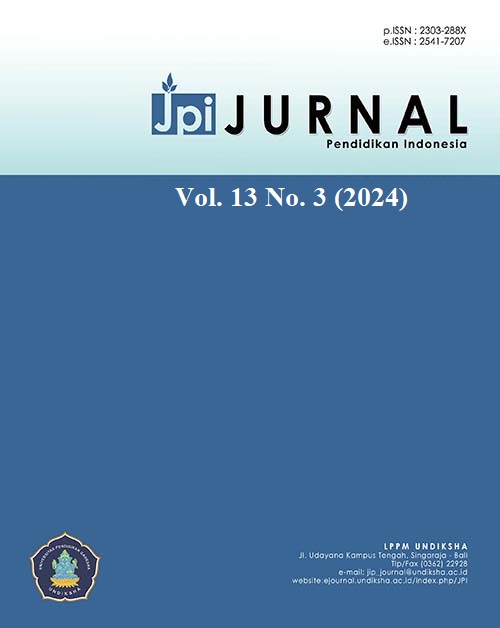Html-Based Digital Flashcard Media to Improve The Mastery of English Vocabulary of 1st Grade
DOI:
https://doi.org/10.23887/jpiundiksha.v13i3.78878Keywords:
Flashcard, Media, Learning, Language, EnglishAbstract
As the main learning actors, teachers often do not use learning media to support student learning outcomes. This study aims to create a feasible and effective digital flashcard media and determine whether digital flashcard media can improve the mastery of English vocabulary of grade I elementary school students. The press developed digital flashcards. This research uses the RnD method with the ADDIE model. The data collection methods used were questionnaires and tests. In contrast, the data collection instruments used were expert validation sheets collected from the assessment of three experts, as well as responses from a teacher and 20 grade 1 elementary school students and test sheets. The data analysis methods used in this research are qualitative and quantitative data. Qualitative data was obtained from needs analysis data, input and product validation suggestions from media validators, material experts, and linguists, and input and suggestions from teacher and student responses. The results showed a significant increase in students' mastery of English vocabulary, as indicated by the difference in pretest and posttest scores. Thus, it can be concluded that digital flashcard media is considered feasible and effective for student learning to improve their mastery of English vocabulary. This study implies that the use of HTML-based digital learning media can be integrated into the English learning curriculum in elementary schools.
Downloads
Published
Issue
Section
License
Copyright (c) 2024 Neta Kurnia Rahma, Arif Widagdo

This work is licensed under a Creative Commons Attribution-ShareAlike 4.0 International License.
Authors who publish with the Jurnal Pendidikan Indnesia agree to the following terms:
- Authors retain copyright and grant the journal the right of first publication with the work simultaneously licensed under a Creative Commons Attribution License (CC BY-SA 4.0) that allows others to share the work with an acknowledgment of the work's authorship and initial publication in this journal.
- Authors are able to enter into separate, additional contractual arrangements for the non-exclusive distribution of the journal's published version of the work (e.g., post it to an institutional repository or publish it in a book), with an acknowledgment of its initial publication in this journal.
- Authors are permitted and encouraged to post their work online (e.g., in institutional repositories or on their website) prior to and during the submission process, as it can lead to productive exchanges, as well as earlier and greater citation of published work. (See The Effect of Open Access)








